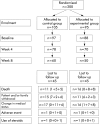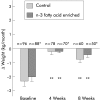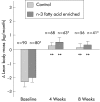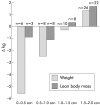Effect of a protein and energy dense N-3 fatty acid enriched oral supplement on loss of weight and lean tissue in cancer cachexia: a randomised double blind trial
- PMID: 12970142
- PMCID: PMC1773823
- DOI: 10.1136/gut.52.10.1479
Effect of a protein and energy dense N-3 fatty acid enriched oral supplement on loss of weight and lean tissue in cancer cachexia: a randomised double blind trial
Abstract
Aim: N-3 fatty acids, especially eicosapentaenoic acid (EPA), may possess anticachectic properties. This trial compared a protein and energy dense supplement enriched with n-3 fatty acids and antioxidants (experimental: E) with an isocaloric isonitrogenous control supplement (C) for their effects on weight, lean body mass (LBM), dietary intake, and quality of life in cachectic patients with advanced pancreatic cancer.
Methods: A total of 200 patients (95 E; 105 C) were randomised to consume two cans/day of the E or C supplement (480 ml, 620 kcal, 32 g protein +/- 2.2 g EPA) for eight weeks in a multicentre, randomised, double blind trial.
Results: At enrolment, patients' mean rate of weight loss was 3.3 kg/month. Intake of the supplements (E or C) was below the recommended dose (2 cans/day) and averaged 1.4 cans/day. Over eight weeks, patients in both groups stopped losing weight (delta weight E: -0.25 kg/month versus C: -0.37 kg/month; p = 0.74) and LBM (Delta LBM E: +0.27 kg/month versus C: +0.12 kg/month; p = 0.88) to an equal degree (change from baseline E and C, p<0.001). In view of evident non-compliance in both E and C groups, correlation analyses were undertaken to examine for potential dose-response relationships. E patients demonstrated significant correlations between their supplement intake and weight gain (r = 0.50, p<0.001) and increase in LBM (r = 0.33, p = 0.036). Such correlations were not statistically significant in C patients. The relationship of supplement intake with change in LBM was significantly different between E and C patients (p = 0.043). Increased plasma EPA levels in the E group were associated with weight and LBM gain (r = 0.50, p<0.001; r = 0.51, p = 0.001). Weight gain was associated with improved quality of life (p<0.01) only in the E group.
Conclusion: Intention to treat group comparisons indicated that at the mean dose taken, enrichment with n-3 fatty acids did not provide a therapeutic advantage and that both supplements were equally effective in arresting weight loss. Post hoc dose-response analysis suggests that if taken in sufficient quantity, only the n-3 fatty acid enriched energy and protein dense supplement results in net gain of weight, lean tissue, and improved quality of life. Further trials are required to examine the potential role of n-3 enriched supplements in the treatment of cancer cachexia.
Figures






Comment in
-
Nutritional therapy for cancer cachexia.Gut. 2003 Oct;52(10):1391-2. doi: 10.1136/gut.52.10.1391. Gut. 2003. PMID: 12970126 Free PMC article. No abstract available.
References
-
- Inagaki J, Rodriguez V, Bodey GP. Causes of death in cancer patients. Cancer 1974;33:568–73. - PubMed
-
- DeWys WD, Begg C, Lavin PT, et al. Prognostic effect of weight loss prior to chemotherapy in cancer patients. Am J Med 1980;69:491–7. - PubMed
-
- Nixon DW, Lawson DH, Kutner M, et al. Hyperalimentation of the cancer patient with protein-calorie undernutrition. Cancer Res 1981;41:2038–45. - PubMed
-
- Evans WK, Nixon DW, Daly JM, et al. A randomised trial of oral nutritional support versus ad lib nutritional intake during chemotherapy for advanced colorectal and non-small-cell lung cancer. J Clin Oncol 1987;5:113–24. - PubMed
-
- Ovesen L, Allingstrup L, Hannibal J, et al. Effect of dietary counseling on food intake, body weight, response rate, survival, and quality of life in cancer patients undergoing chemotherapy: A prospective, randomised study. J Clin Oncol 1993;11:2043–9. - PubMed
Publication types
MeSH terms
Substances
LinkOut - more resources
Full Text Sources
Other Literature Sources
Medical
Research Materials
